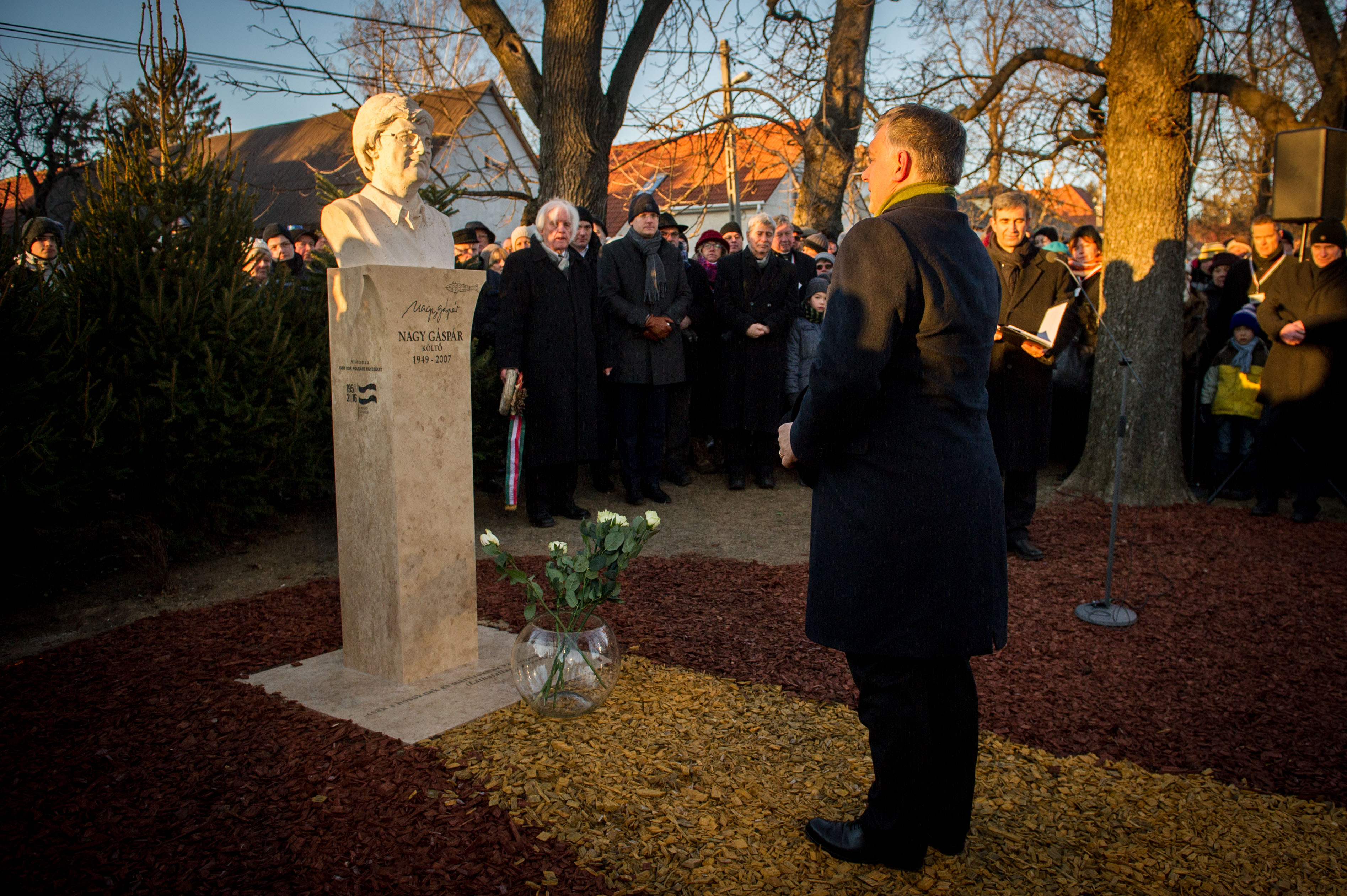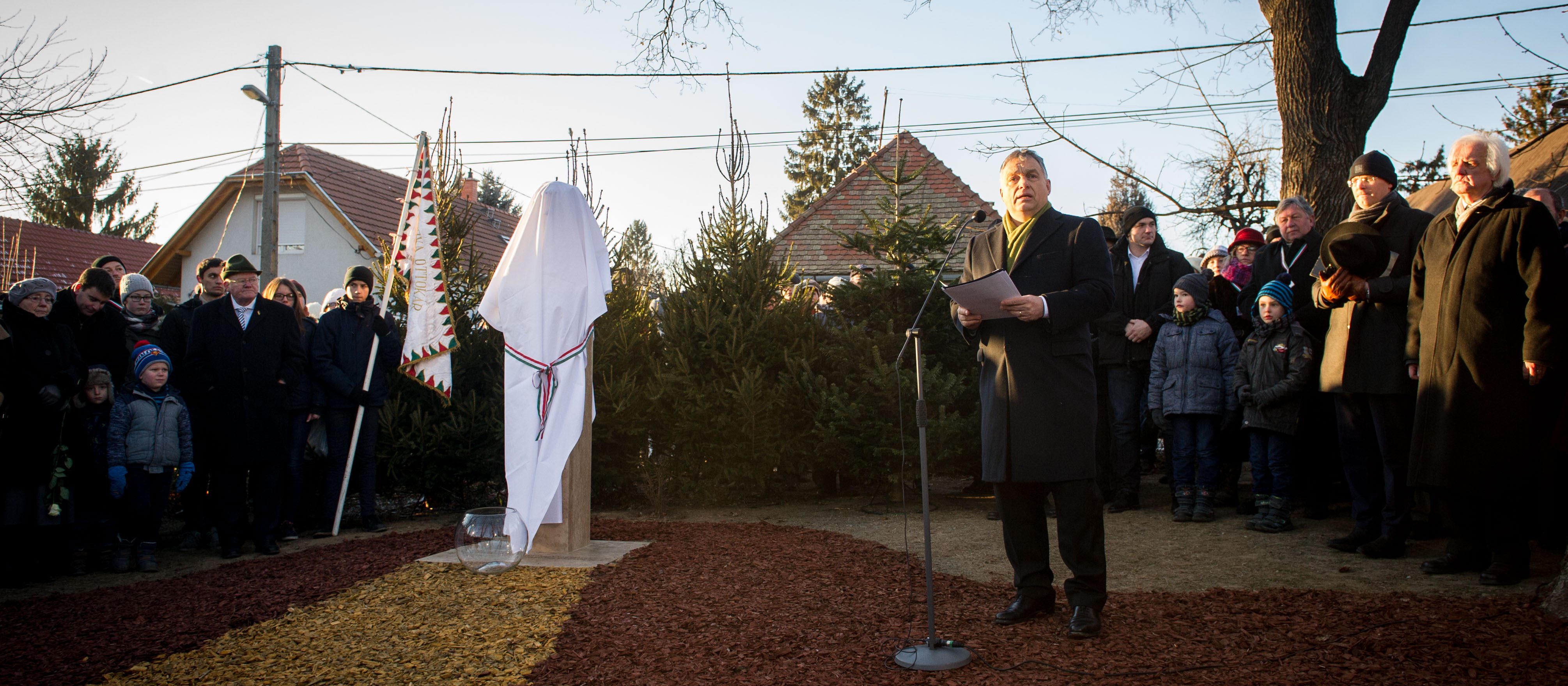
Márta, Citizens of Budakeszi,
There must be something beyond sheer willpower that leads this many people to voluntarily risk hypothermia on a freezing Saturday afternoon in January – and to do so for the unveiling of a statue. This thing beyond sheer willpower is love itself. We loved Gáspár Nagy, and this is why we are here today. At the end of funeral orations we often ask for the memory of the departed to be blessed; now we have gathered to inaugurate a statue to the blessed memory of our beloved friend, Gáspár Nagy.
“God must have loved me, because he accepted me, too, as his creature: made from mud, clay, and the dreams of my father and mother.” It was with these words, ten years ago, that Gáspár Nagy, the harbinger of eternal summer, bade us farewell. Everything which one can say about him is in these lines: his firm, unshakeable – and yet humble – faith; the spirituality of the Pannonhalma Benedictine School; and the warmth of his childhood home in Bérbaltavár. We remember Gáspár Nagy as someone who saw it as a personal mission to obey the eternal Christian command to remember the martyrs of 1956. In this sense, in the mid-eighties he struck home against the “comrades” who had settled themselves in the shade of the Judas tree which had been planted some thirty years earlier.
Citizens of Budakeszi,
There is only type of person better than those who are prepared to test barriers in the name of truth: those who also have the courage to break through such barriers. Gáspár Nagy was one such person. He did not consciously seek this mission: instead he let the mission seek him. He had the courage to write things which others dared no more than say, and he spoke of things about which most people chose to remain silent. With his gently relentless determination, he shattered the communist lies fabricated about the heroes of “the October Spring”. Throughout two decades, twenty-three agents spied on his every move. Since then we have all come to realise that goulash communism, marching towards its slow, agonising death, had every reason to fear the words he used in throwing down the gauntlet before it: when the freedom fighters of the 1956 Revolution are accorded the justice and respect they truly deserve, there and then the Hungarian communist system will fall and perish. His poetry and acts of personal bravery opened up the path which has led here. His poems sought to dismantle the regime, but for them to even reach the presses the censors demanded that he perform exceptional feats of poetic gymnastics. Under these circumstances he managed to achieve something which in the history of Hungarian literature only the bravest and most committed poets were capable of: through his poetry he succeeded in transforming the fate of the Hungarian nation. Even at the time an entire generation – our generation – learnt from him the courage to stand tall and upright; we learnt from him the sense of purpose which made him ready to defend – until the last bullet – the thousand-year tradition of Hungarian freedom; we learnt from him the perseverance which endured censorship, silencing and harassment with head held high – even in the most chilling period of the nineteen-eighties. He was our true hero, who – wherever he went in the Carpathian Basin – left small circles of freedom in his wake: just like here, in Budakeszi. His political and spiritual testament lives with us: it is a compass and guiding star, which also serves as a beacon for our work in government. In poor imitation of him, I could say: to preserve memory, to remain worthy, to raise our country.
Ladies and Gentlemen,
Before unveiling this statue, however, it is important to say something liberating from his work. It is important to say something which we can learn from poets like him: poets who belonged to Petőfi’s corps, and who see political correctness – which today is so fashionable, and obligatory in some countries – as the ultimate litmus test for recognising false prophets. Together with those poets, today we ask ever more urgently about the fate of our country, and that of an unhappy, hypocritical Europe, which hangs by a thread while modern myths are used to silence our continent’s acquiescent conscience. The answer comes from Gáspár Nagy himself: “Hope cannot die if the thread is spun from the right loom”.
Blessed be his memory!

